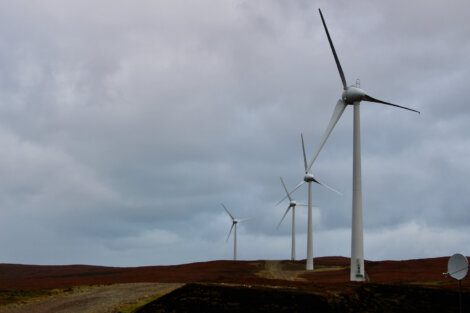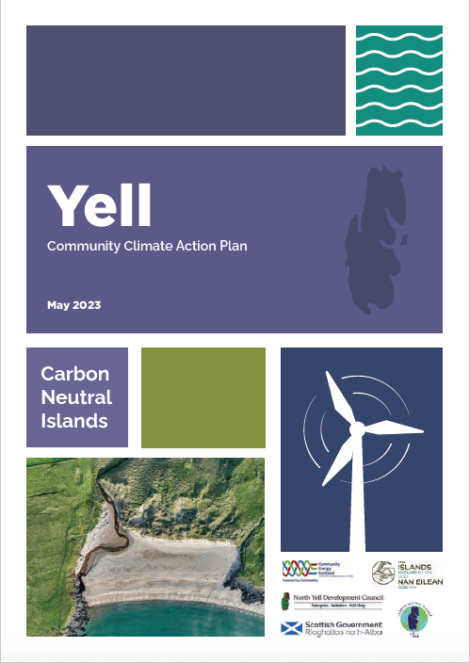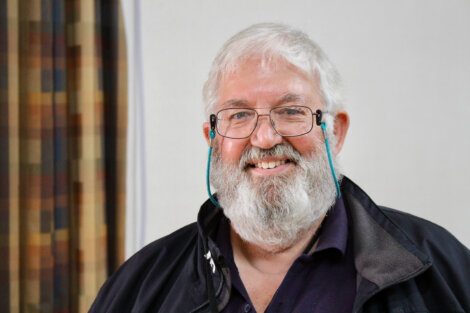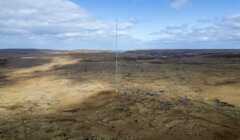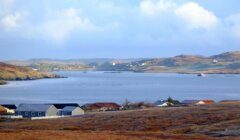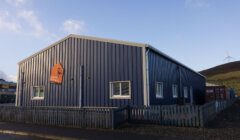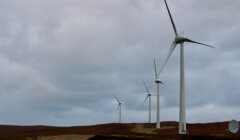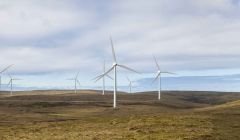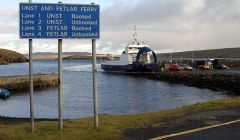Climate / Degraded peat a big part of Yell’s emissions, carbon study concludes
AN ESTIMATED 80 per cent of Yell’s carbon emissions can be traced back to the land, according to a new study.
These emissions occur primarily from peatlands, much of which has been considered to be in a degraded state and as such is acting as a net source of emissions.
But there is a concession that further analysis is required to increase the accuracy of the figures given the data sources.
Meanwhile the study also highlights big support within the Yell community for investigating fixed links as an alternative to ferries to the island, which could stand to reduce emissions.
The study has been published as part of the Scottish Government scheme which picked Yell as one of six islands to become carbon neutral by 2040.
While the overarching theme of the project is climate resilience, it aims to improve quality of life, create employment and support the sustainability of the community.
The project considers carbon neutrality to be “akin to net zero”.
It says a “carbon neutral island is an ‘island where the greenhouse gas emissions (captured as CO2 equivalent) are in balance with the sinks’.”
In this instance sinks can be natural resources capable of absorbing CO2, or technological solutions that do the same thing – such as carbon capture and storage.
As part of the project a Community Climate Action Plan for Yell has now been released – and the land has been pinpointed as a major player.
It attributes an estimated 80 per cent of emissions in Yell in 2019 could be included in the category ‘land use, land use change and forestry’ (LULUCF).
This produced an estimated 70,742 tonnes of CO2 equivalent.
But the study said the data is based on satellite imaging and highlights that further analysis of the quality of peatland is required to increase accuracy.
Become a member of Shetland News
Last month around 600 hectares of land in Yell went under offer – with peatland restoration for generating ‘carbon credits’ pinpointed as a possible future use.
The study suggests nearly nine per cent of emissions in Yell in 2019 came from energy use, around seven per cent from transport and 4.4 per cent from agriculture.
The next stage of the Carbon Neutral Islands project will involve refining the ideas coming from the community engagement process to create more detailed proposals.
These actions will be evaluated in terms of estimated costs, their feasibility, the likely carbon impact and the wider benefits to the community.
The island of Yell, located between the Shetland mainland and Unst, already has a five-turbine community wind farm, and it is the base for Nova Innovation’s pioneering tidal energy project in Bluemull Sound.
There is also the 17-turbine Beaw Field wind farm development, which is consented but is not yet under construction.
Plans for the larger 18-turbine Energy Isles wind farm in the northwest remain under consideration by the Scottish Government.
The carbon audit plan said emissions associated with electricity use contribute around 64 per cent of total emissions from the energy sector in Yell.
Heating oil accounts for around 18 per cent, with other fuels such as gas oil, coal and peat making up most of the remainder.
The most popular possible action relating to energy in the community is the idea of Yell having a connection point to local renewables, so in the event of a power cut there can still be supply.
There was also support for small scale domestic renewable energy projects and local spend from community benefit funds given out by wind farm developers.
People were also keen to see more support to improve or replace doors and windows in homes, and install better insulation.
When it came to transport, Yell’s share of the council’s diesel-powered ferries was the highest emitter, accounting for around 63 per cent.
There was widespread support from the community for investigating the environmental impact of tunnels.
It comes as action groups in Yell and Unst are set to fundraise for initial geotechnical surveys for possible tunnels to the islands.
Other ideas which drew support from the community were a more comprehensive bus service, local fish and lamb available to buy locally to reduce food miles, community-owned Polycrubs and a local skip and scrapstore.
Every household in Yell was given a survey to fill in to support the development of the carbon audit, whilst folk were also invited to discuss the project at ‘Keep Yell Warm’ events in Cullivoe through the winter.
Other public consultation events were held in Yell too.
The other five islands in the project are Great Cumbrae, Barra, Hoy, Islay and Raasay, and all six have now published their action plans.
Rural affairs, land reform and islands secretary Mairi Gougeon said: “Supporting these islands in their journey towards net zero will not only benefit the environment, but will energise local economies and improve the general wellbeing of islanders.
“The impact of this project will extend well beyond the shores of the six islands.
“The knowledge gained throughout this journey will be shared to help support all of Scotland’s island communities, and indeed mainland communities, as they seek to forge a future that is both climate-friendly and sustainable.”
North Isles councillor Robert Thomson, who is from Yell, said the issue regarding land emissions is naturally a Shetland-wide matter.
“We’ve had similar messages from the team at the SIC that it’s going to be challenging to get to net zero,” he said.
He also highlighted that the emissions figures regarding peat may not fully be accurate due to the methodologies used.
But Thomson also spoke up for doing work that can support people in the community – such as insulating more homes.
“I think we’ve got to try to work on things that affect people the most – like the whole energy crisis and cost of energy, and looking at ways you can address things like that, and helping people to have more insulated homes so they don’t have to use as much energy,” he said.
Become a member of Shetland News
Shetland News is asking its many readers to consider paying for membership to get additional features and services: -
- Remove non-local ads;
- Bookmark posts to read later;
- Exclusive curated weekly newsletter;
- Hide membership messages;
- Comments open for discussion.
If you appreciate what we do and feel strongly about impartial local journalism, then please become a member of Shetland News by either making a single payment, or setting up a monthly, quarterly or yearly subscription.






